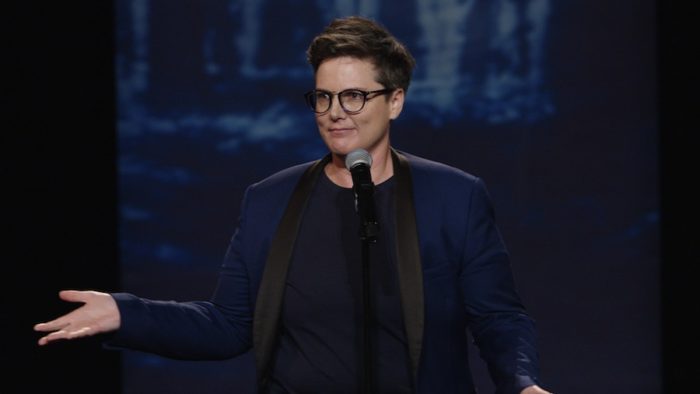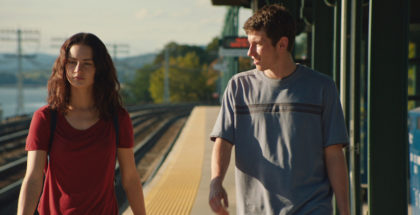Netflix UK TV review: Hannah Gadsby: Nanette
Review Overview
Anger
10Humour
10Heart
10David Farnor | On 24, Jun 2018
“I’ve made my story into a joke,” Hannah Gadsby tells us in her comedy special, Nanette. It’s the starting point of all stand-up, the foundation of the form: experience becomes anecdote, situation becomes set-up, resolution becomes punchline. But Gadsby, as she breaks these rules down for us, turns her personal tale into something much more than your average stand-up set. It’s humour as a weapon, laughter as a counterpoint to anger.
That anger has been bubbling for a long time. Gadsby grew up in Tasmania, where her dawning sexuality was a private prison rather than a personal discovery – on her small island, homosexuality was illegal until 1997, a date that’s uncomfortably recent. She talks through life in that toxic environment, and how much and how little it’s changed since, and what emerges is a personal, frank account of abuse. It’s a vitriolic, righteous takedown of prejudice and the complicit, complacent way that a male-oriented society enables and ignores discrimination and assault. “The to men in the room, who feel I may have been persecuting you this evening,” she quips, after a long tirade that brings her to tears and the audience to their feet. “Well spotted.”
But Gadsby’s feeling of being out-of-step with the world encompasses a wide range of topics, as she challenges a malignant, harmful culture that has hurt her, physically and mentally, and is hurting countless others. Even the rainbow flag of Pride is something she doesn’t quite identify with, as she’s quieter than the loud, boisterous colours it represents. “I identify as tired,” she jokes with a sigh of pathos.
In the current, hysterical world, her anger and exhaustion is tragically familiar, but even then, this is just an hour’s taste of what she’s endured and fought through over several decades. As a woman, a lesbian, an Australian, a comedian, her anger on-stage is perhaps only striking because we’re so used to seeing rage-fuelled comedy routines in the mouths of men, who are already in a position of power and privilege. “If they’re having a tough time,” she wryly remarks, “the rest of us are goners.”
Her witty observations take no prisoners, even mocking the perceived group of lesbians who have no sense of humour, before launching into a pointed discussion of art history and the unsavoury personal life of Pablo Picasso. If that seems like an unexpected diversion, it only feeds back into her underlying theme, one that reinforces the impossibility of separating artist and art. For her, the art of comedy has traditionally been self-deprecating, but that only fuelled a cycle of self-resentment. If comedy is about building up tension and relief, not following a joke through to a positive resolution only constructed a limbo for her story – a poetic deconstruction that feels both metaphorical and powerfully literal.
The result is an expertly constructed 70 minutes that draw a sharp line between humility and humiliation, between suspense and release, between comedy and catharsis. She deftly builds unease in the room with a skill that recalls Stewart Lee, but with a heartfelt purpose that trumps his efforts; the pay-off to the increasingly intense atmosphere shrugs off the easy anti-climax of a punchline, instead turning it into a challenging attack on convention, a moving study of parental neglect and unspoken compassion, a devastating outpouring of trauma, stigma and the weariness it causes. At the heart of it all is a stirring portrait of a woman who refuses to turn her story into a joke any more, instead delivering something much more profound and real – comedy as a positive, feel-good tale, an antidote to hatred and anger.
“There is nothing stronger than a broken woman who has rebuilt herself,” she declares. That strength powers this blistering swan-song to an all-too-short career, an hour-long performance that will have you howling and crying from your insides. It’s a unique, astonishing piece of art that destroys you – and just might destroy stand-up comedy too.
Hannah Gadsby: Nanette is available on Netflix UK, as part of an £9.99 monthly subscription.





















